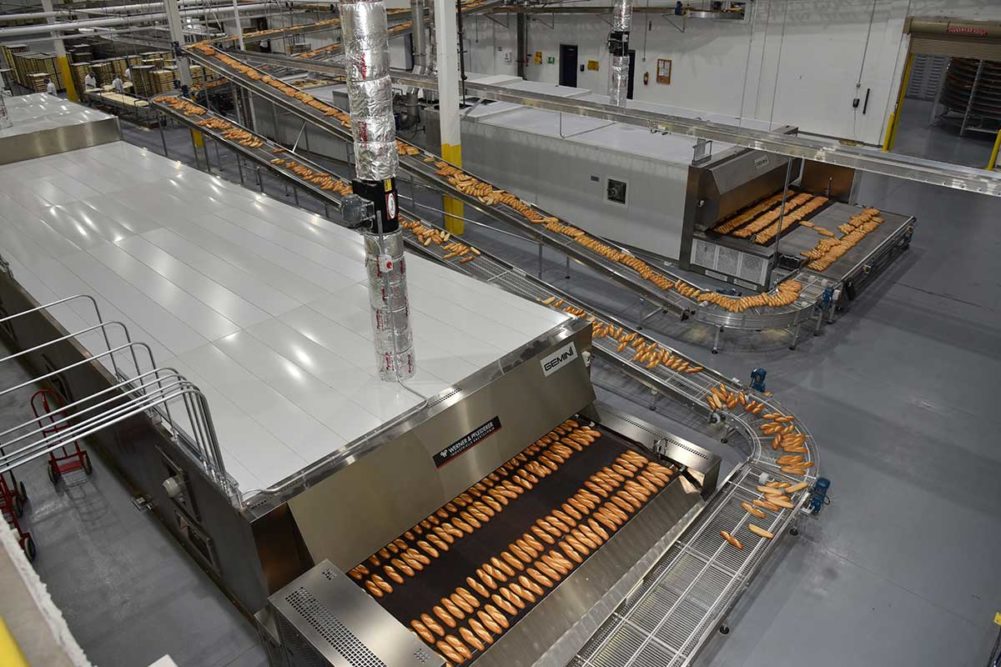Bakeries and snack producers have gotten the message loud and clear. Unlike in the past when maintenance departments were seen as a necessary expense to keep the operation running, more progressive companies are now investing in tools as they realize that preventing any unnecessary downtime directly bolsters their bottom line.
Recent tradeshows such as last year’s International Baking Industry Exposition (IBIE) saw a bevy of new controls, programs and so-called smart devices that monitor everything from time, temperature and the quality of the baking process to hidden vibrations and other indicators that could be a precursor to a major problem.
Compliance to oven safety standards is another issue. At IBIE, for instance, Flynn Burner introduced its Oven Safety Auditor+ (OSA+). This device allows maintenance personnel to complete an audit of an oven’s safety circuit components in minutes with OSHA and National Fire Production Association requirements, noted Dom Medina, president, Flynn Burner. The OSA+ audit may be locally stored, copied to an SD card or emailed.
“Our customers had been requesting this type of device for a few years now,” he said.
Overall, bakers are asking oven suppliers about supply chain, new technology, automation, delivery and factory acceptance testing of equipment, said Clent Hollin, category sales account manager, Baker Thermal Solutions, a Middleby Bakery company.
“Since COVID-19, I’ve seen a shift in how they approach new equipment purchases,” he observed. “The questions and concerns are around spare parts and services that the OEM can provide. Across our industry, one of the biggest challenges is finding and retaining skill labors. If you can support your customers with US-based spare parts and services across all brands, they are more willing to continue the conversation around your solution. There is a significant cost saving to the customer by having that local resource rather than traveling from abroad.”
Because of the long-term payback, investing in maintenance is garnering more attention than in the past.
A recent automation study by PMMI, the association for packaging and processing technologies, showed 58% of consumer packaged goods companies use remote access, while 32% plan to use it in the next three years.
The survey also indicated 43% of respondents currently rely on predictive maintenance, while 45% expect to roll it out soon.
Shawn Moye, vice president of sales, Reading Bakery Systems (RBS), said the RBSConnect advanced control platforms can monitor oven run times and provide estimated maintenance schedules so that oven operators can become more involved in the autonomous maintenance process.
“This allows more assurance that all lubrication points are maintained on schedule along with required filter cleaning and other items,” Mr. Moye explained. “Involving the oven operators in these functions enables them to become more familiar with the ovens and provides additional time for maintenance personnel to work on other items outside of the operator’s daily responsibilities.”
For its part, Mecatherm recently rolled out M-Care, a predictive maintenance application.
“M-Care makes it possible to promptly detect anomalies on equipment and to guide operators and maintenance teams on the first level checks to be carried out,” said Marie Laisne, product marketing manager, Mecatherm. “The aim is to prevent breakdowns and optimize the availability rate of production line equipment.”
The combination of sensors and software for real-time data collection together with carefully planned cleaning and inspection activities are all ways to reduce downtime, said Nicola Menardo, president of TP Food Group North America. He added the Gostol Smart Bakery Line portal can continuously monitor TP Food Group’s and third-party equipment.
“Such a portal allows monitoring a whole bakery line, calculating overall equipment effectiveness and providing information on service intervals and needs of critical spare parts, which can even be digitally pre-ordered,” Mr. Menardo explained. “In addition, performing pre-emptive inspection activities proves to be particularly effective in anticipating issues before they turn into actual problems.”
Another option for saving energy and ensuring product consistency is to make sure ovens have been properly serviced and are in good operating condition with the burners tuned and ovens balanced, advised Jerry Murphy, vice president of sales, Gemini Bakery Equipment.
A preventive maintenance program, he added, is a good way to simplify scheduled downtime and eliminate unscheduled interruptions.
“Periodic bearing vibration testing can monitor the health of the bearings and detect any negative trends,” Mr. Murphy said. “Monthly safety testing can avoid unseen issues. Annual burner inspection and tuning is not only a good practice but is required by regulatory agencies. A full vacuuming of the oven is recommended every five years at a minimum to keep the oven performing at its best.”
This article is an excerpt from the February 2023 issue of Baking & Snack. To read the entire feature on Ovens, click here.






